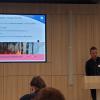
The HuT is an Innovation Action project funded by the Horizon Europe Framework Programme. The project addresses the distributive justice implications of extreme climate event impacts and aims at developing innovative and procedurally just Disaster Risk Reduction (DRR) solutions for dealing with extreme climate events.
The project will integrate and leverage on best practices and successful multi-disciplinary experiences aiming at establishing fair processes, that have been recently developed in various territorial contexts by leading European research groups, institutions and stakeholders. A set of demonstrators will constitute a virtual multi-hazard arena wherein possible disastrous events associated with climate extremes that will unequally affect different population subgroups will be dealt with jointly by representatives of scientific and technical communities, stakeholders, policymakers and local communities. The proposal contributes to the achievement of a more efficient and equitable cross-sectoral, cross disciplinary, cross-border coordination of the disaster risk management cycle from the international to local scales.
A set of ten demonstrators will constitute a multi-hazard arena wherein possible disastrous events associated with climate extremes will be dealt with jointly by representatives of the scientific and technical communities, practitioners, policymakers and local communities. The events associated with climate extremes that will be considered in this project are: forest fires, including wildland urban interface fires; meteorological/hydrological/agricultural droughts, including associated water shortage; heatwaves; weather induced landslides, including debris flows; fluvial and pluvial floods; storms, including heavy rain, hail, thunderstorms, and storm surges. The HuT will mainly focus on the prevention and preparedness phases of the disaster risk management cycle, explicitly considering climate change scenarios and integrating the proposed set of solutions, for the various events considered, over short- (from days to several months) and long-term (from years to decades) time horizons. The activities of the project will be developed considering the following main critical dimensions: trans-disciplinarity, systemic risk, coproduction, cross-fertilization, transferability, and long-term legacy.
IIASA Role
The Equity and Justice (EQU) Research Group at IIASA will lead WP3 and contribute to the following objectives across selected demonstration cases:
• Facilitate equitable multi-hazard Disaster Risk Reduction (focus on Nature-based Solutions) by identifying and addressing governance, policy and market enablers and barriers at local, national and EU scales;
• Support procedurally just DRR policy processes by developing and applying innovative participatory decision and gaming tools;
• Identify fair and viable strategies to advance risk transfer and finance solutions by developing prototypes of novel insurance products.
The project is related to EQU's expertise on assessing and addressing procedural and distributional justice concerns in the context of the climate crisis (reflected e.g. in research projects FIRELOGUE, TransLoss) and in addition builds on ongoing EQU projects that are focusing on nature-based solutions (Landslide EVO, Phusicos).
The Agriculture, Forestry, and Ecosystems Services (AFE) Research Group will provide modelling expertise to Work Package 4 on Innovative Nexus Modelling.
Consortium of partners
The HuT will be implemented by a consortium of 25 partners and collaborating organisations from 12 countries. The consortium relies on a scientific coordination team with long-standing expertise in coordinating and participating in large EU collaborative research projects. The integration of partners from different complementary backgrounds into a coherent high-profile consortium, provides significant synergetic benefits to the project.
Partners and collaborating organisations
1. Universita Degli Studi di Salerno, IT (coordinator)
2. Fondazione Centro Euro-Mediterraneo sui Cambiamenti Climatici, IT
3. Helmholtz-Zentrum HEREON GmbH, DE
4. Helmholtz Zentrum Potsdam Deutsches Geoforschungszentrum GFZ, DE
5. International Institute for Applied Systems Analysis (IIASA), AT
6. Universitat Politecnica de Catalunya, ES
7. Universitat Politecnica de Valencia, ES
8. Stiftelsen Norges Geotekniske Institutt, NO
9. Global Water Partnership Central and Eastern Europe, SK
10. Helsingin Yliopisto, FI
11. Verdustofa Islands, IS
12. Vilniaus University, LT
13. ARANTEC ENGINHERIA SL, ES
14. Közép-Tisza-Vidéki Vízügyi Igazgatóság, HU
15. Fondazione Icons, IT
16. Leitha SRL, IT
17. Comune di Sorrento, IT
18. Confagricoltura Nuoro Ogliastra, IT
19. National Commissioner of the Icelandic Police, IS
20. AUSTURBRU SES, IS
21. Universite de Geneve, CH
22. University College London, UK
23. MET Office, UK
24. United Kingdom Research and Innovation, UK
26. Global Network of Civil Society Organisations for Disaster Reduction, UK
Funding
The HuT project has received funding from the European Union's Horizon Europe Framework Programme for Research and Innovation (2021-2027) under grant agreement No. 101073957.
Scolobig, A., Martin, J.G.C. , Linnerooth-Bayer, J., Balsiger, J., Baruffa, C., Andrea, A., Buckle, E., Calliari, E., Goltara, A., Jurik, J., Mink, F., Pucci, L., Valdelfener, M., Sudmeier-Rieux, K., Wicander, S., Bethe, J., & Staccione, A. (2020). Policy innovation for Nature-based Solutions in the Disaster Risk Reduction sector. IIASA/Universite de Geneve
Martin, J.G.C. , Scolobig, A., Linnerooth-Bayer, J., Liu, W. , & Balsiger, J. (2021). Catalyzing Innovation: Governance Enablers of Nature-Based Solutions. Sustainability 13 (4) e1971. 10.3390/su13041971.
Martin, J.G.C. , Linnerooth-Bayer, J., Liu, W. , & Scolobig, A. (2019). Governance innovation through nature-based solutions. IIASA Policy Brief. Laxenburg, Austria: PB-25
Martin, J.G.C. , Scolobig, A., Pelling, M., Linnerooth-Bayer, J., Deubelli, T. , Liu, W. , & Oen, A. (2022). Transformative Adaptation through Nature-Based Solutions. In: Österreichischer Klimatag 2022, 20-22 April 2022.
Calliari, E., Castellari, S., Davis, M., Linnerooth-Bayer, J., Martin, J.G.C. , Mysiak, J., Pastor, T., Ramieri, E., Scolobig, A., Sterk, M., Veerkamp, C., Wendling, L., & Zandersen, M. (2022). Building climate resilience through nature-based solutions in Europe: A review of enabling knowledge, finance and governance frameworks. Climate Risk Management 37 e100450. 10.1016/j.crm.2022.100450.
Laurien, F. , Martin, J.G.C. , & Mehryar, S. (2022). Climate and disaster resilience measurement: Persistent gaps in multiple hazards, methods, and practicability. Climate Risk Management 37 e100443. 10.1016/j.crm.2022.100443.
News

04 October 2023
FLAM Presentation at the Potsdam Institute for Climate Impact Research (PIK)

05 September 2023


